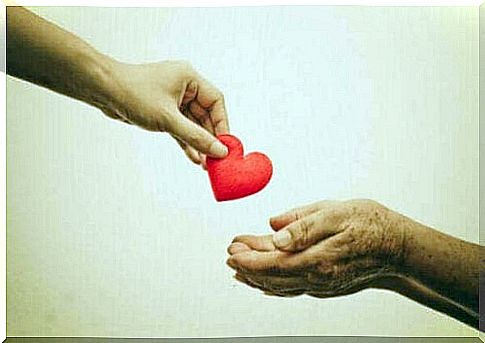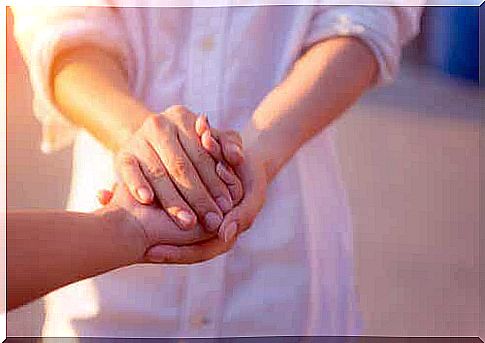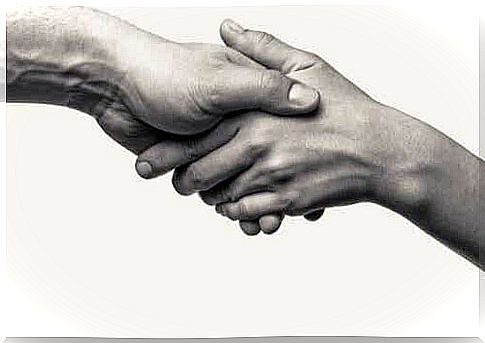Prosocial Behavior: Do You Help Others Based On Empathy Or Concern?

Prosocial behavior (such as helping someone in the family, a friend, or a stranger on the street) can make you feel altruistic and friendly. Giving a helping hand to a person in need can make you feel like a good person with good values and high standards. Similarly, you may feel selfish when you choose not to help. But have you really stopped and pondered whether this behavior of helping is in fact an unselfish act?
Have you ever thought about what hidden motives might be behind your willingness to help and be generous to others? Are you sure it’s always about understanding and empathy? What if the desire to contribute to someone else’s well-being is not really the cause of your solidarity? Some studies that have analyzed these conditions have come to some interesting conclusions.
Do you help others based on empathy or concern?
Researchers have been studying prosocial behavior for many decades. What makes people help others? Is this an innate quality that everyone is born with or is it culturally acquired? Many authors have debated these and other similar issues.
Let’s look at it through an example. It has been proven that at the brain level, when we see another human being suffering, our brain activates the same neural network that is involved in the suffering person’s emotional process. In other words, it is a fact that most people have the ability to experience other people’s pain as if it were their own. Maybe you’re one of these.

But what exactly do you feel in these situations? The hypothesis that seems to have the most empirical support is that we humans can react in two different ways when we see someone in need:
- On the one hand, we can react with anxiety, disgust, worry or fear
- On the other hand, we can experience compassion and understanding. We can feel genuinely affected.
Depending on various factors, one of these reactions is stronger than the other. On the one hand, it depends on the circumstances surrounding the suffering of the observed person. On the other hand, it depends on the observer’s personal disposition. When different people are faced with the same situation, they can thus have different reactions. For the same reason, the same adjacent may have different reactions on two different occasions.
What is your motivation?
Whether the situation is causing you anxiety or pity, it is more than likely that you will help someone you see in need. But your motivation for your actions may be different in each individual case.
Basically, people tend to have selfish patterns regarding their actions when they experience danger, disgust or anxiety. In other words, they can help others to reduce the discomfort they experience when they see them in need. If, on the other hand, they feel affected, their actions are genuinely altruistically motivated – and they focus on the suffering of the affected person and not their own.
It was a group of university students who during the conduct of some studies discovered this. They saw that the type of pattern of action depended on the emotions experienced. The basic premise was that those who experienced anxiety acted with the motivation to reduce their anxiety. And those who felt compassion acted with the goal of reducing the need of the sufferer.
You can not just choose which reaction to activate in you. Therefore, it is not possible to say that one group is more supportive than another on a moral level. In addition, another fact that one of these studies came to: when the helping action came at a high price, the people who tended to feel genuine empathy showed a selfish pattern of action. It seemed that when personal sacrifice was involved, this leveled off the first altruistic impulse.

Is prosocial behavior something that everyone practices?
These findings increase the ever-evolving ambiguity as to the extent to which a human being is genuinely caring, altruistic, and generous. You probably know that helpful actions often give the donor a sense of gratitude. But now you also know that it is something that will help you reduce your own discomfort.
As you can see, it is the helper’s emotions that determine his or her actions. But the question is whether this means that we can claim that caring for another person is really what makes them act? In any case, and whatever the underlying motivation is, prosocial behaviors are beneficial behaviors. Helping those around you creates guaranteed well-being. It is also important that we adhere to these behaviors in order to create a more satisfying social interaction with each other.









